
El Dorado and Butler County, Kansas
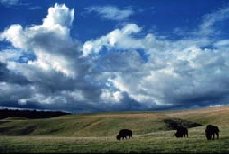
El Dorado - The Prairie Port of Kansas
El Dorado, the county seat of Butler County, began as a trading point and cattle town on the banks of the Walnut River in the 1860s. The dial telephone was invented by Almon Strowger of El Dorado in 1889. In 1912 the first woman's jury in Kansas served the court. In 1915, oil was discovered, and since that time, El Dorado has boomed from a small town into a progressive city. Oil continues to be a major industry in El Dorado.
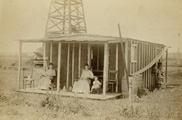
Photo from Wichita State University Libraries
Department of Special Collections
There is lots to do in El Dorado. Visitors can learn about our oil history at the Kansas Oil Museum, which is operated by the Butler County Historical Society. The Coutts Memorial Museum of Art is fine art gallery with art objects by such artists as Renoir, Thomas Hart Benton, Frederic Remington, and Charles M. Russell.
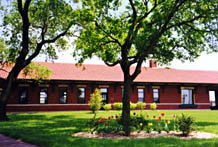
The old Missouri Pacific Railroad Depot, shown above, is a meeting place for area residents.
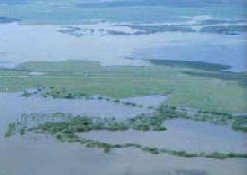
El Dorado Lake, an 8,000-acre lake impounding the Walnut River, is located just north and east of the city of El Dorado at the edge of the scenic Flint Hills. The reservoir was constructed by the U.S. Army Corps of Engineers as a multi-purpose flood control, water supply, and recreational project, and was completed in 1981. There are approximately 98 miles of shoreline. It is under the supervision of El Dorado State Park.
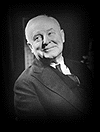
William Allen White - 1868-1943
Noted journalist and Pulitzer Prize winner, William Allen White, born 10 February 1868, spent the majority of his childhood in El Dorado. He was the son of Allen White, country merchant and doctor, and Mary A. Hatten White, pioneer Kansas teacher.
White was best known as publisher of The Emporia Gazette, and his articles about Kansas and the Republican Party (both favorite topics) were read across the U.S.
In his later years he was an elder statesman of the Republican Party. The only time in his long career he swerved from his party loyalty was in 1912, when he supported his good friend, Theodore Roosevelt, for President. A statue in his honor can be found at Vine and Central in El Dorado.
The Kansas-Nebraska Act of 1854 had as its primary purpose establishing the two territories of Kansas and Nebraska, but also was written "not to legislate slavery...nor to exclude it...but to leave the people thereof perfectly free to...regulate their domestic institutions in their own way, subject only to the Constitution of the United States." The Act served to repeal the Missouri Compromise of 1820 which prohibited slavery north of latitude 36°30´.
The volatile period following, involving conflict between pro-slavery and anti-slavery advocates, culminated in Kansas becoming a free state. Butler County is named for Senator Andrew Pickens Butler of South Carolina. Senator Butler was an ardent pro-slavery advocate who voted for the Kansas-Nebraska Act. Butler County was one of the 33 original counties created during state control by pro-slavery advocates. The later Free State legislature allowed the name to remain unchanged.
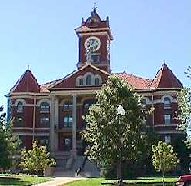
The beautiful Butler County courthouse is located on Central Avenue in El Dorado.

Email Us
About Membership

Return to Home Page